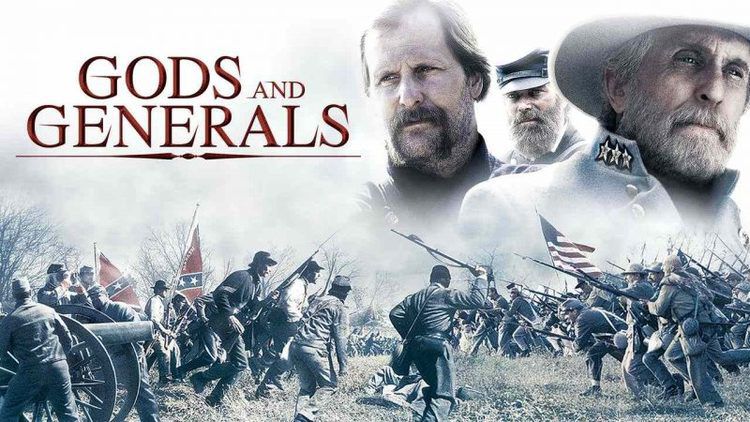


By Sam Francis
02/13/2003
Ted Turner, executive producer of "Gods and Generals," which premiered in Washington this week, "didn’t set out to make an antiwar movie," the Washington Post concluded in its coverage of the event, "but history is funny that way." Not as funny as the Post, which managed to miss the entire point of the movie — that, as horrible as war might be and the American Civil War actually was, some things are worth killing and dying for. [Washington’s Front-Row Seat For History, By Roxanne Roberts, Washington Post, February 11, 2003]
Obsessed with the "VIP audience" that attended the world premiere and hypnotized by the celebrity of Mr. Turner, the Post was easily misled. As a not very important part of the VIP audience, I was not. In the first place, "Gods and Generals" is not an antiwar movie; it’s just a very honest movie about war. Its scrupulously accurate battle scenes lack the tasteless carnage of Steven Spielberg’s "Saving Private Ryan" but nevertheless slam into your soul the horror of war, no matter how well justified. In the second place, the star of the evening was not Mr. Turner. It was the writer, producer and director of the film, Ron Maxwell.
Mr. Maxwell, noted for his earlier production of "Gettysburg," based on Michael Shaara’s novel about the great Civil War battle, "The Killer Angels," has turned out what is known today as a "prequel," telling the story of the war from its beginnings after Virginia’s secession down to the Battle of Chancellorsville in May, 1863, two months before Gettysburg. The movie is based — loosely — on the novel of the same name by Mr. Shaara’s son, Jeff.
I say "loosely" because Mr. Maxwell essentially rewrote the book, which recounts the epic through the personal stories of several major players in it: Robert E. Lee, Thomas "Stonewall" Jackson, Union war hero Joshua Chamberlain, and others. In Mr. Maxwell’s version, Jackson quickly emerges as the main hero, and the others tend to dwindle in comparison. There’s a reason for this: The real hero of the film is not so much Stonewall Jackson himself as what Mr. Maxwell argues he represents: A Southern civilization defined by religious faith and a ferocious determination to be free of Northern dominance.
That’s the point the Post managed to miss entirely, but you can bet your boots others won’t. For perhaps the first time since D.W. Griffith produced "Birth of a Nation" in 1915, Mr. Maxwell has had the courage and the vision to make a movie that tries to tell the Southern side of the war seriously. It’s a side that downplays slavery and race, a point the movies' other critics are not going to drop.
It has now become a commonplace on both left and right that the Civil War was really about slavery and Abraham Lincoln’s righteous determination to abolish it, even at the cost of 600,000 American lives. That’s a huge historical blunder that Mr. Maxwell’s movie corrects. As he has Chamberlain explaining in the film, ending slavery was never an original war aim of the Union, and as both Lee and Jackson insist, it was resistance to Northern military aggression that pushed Virginia and the Upper South into secession, not a commitment to slavery.
Actor Stephen Lang’s performance as Jackson, driven by intense religious fires, dominates the movie. Mr. Maxwell is perhaps on weaker ground in having Jackson deliver a short sermon to a slave on how slavery is bound to end. From what I know of Jackson, he thought little about slavery, except to believe that God had established it. Mr. Maxwell may be skirting inaccuracy — and a certain amount of political correctness — in trying to ignore what was a genuine Southern belief that racial slavery was divinely ordained, though Lee himself (played in the movie by Robert Duvall) was a good deal less attached to the peculiar institution than many.
But the director is certainly right to say that for Virginians it was resistance to Lincoln’s call for 75,000 troops to crush the "rebellion" in the Deep South that led the Old Dominion and its Upper South sisters out of the Union. Lincoln’s call for troops is what caused the war — not secession, not slavery, and not firing on Fort Sumter. The prospect of an American president sending troops to fight other Americans was too much for Virginians — and most other Southerners and many non-Southerners — to swallow.
And that, as Mr. Maxwell’s great movie tries to tell us, is what is really worth fighting for — national independence and the freedom that goes with it. These days, when we're told that national sovereignty is on the way out and Americans are about to be dragooned into fighting yet another war for other peoples' countries, it’s a point that no American, North or South, can afford to miss.
COPYRIGHT CREATORS SYNDICATE, INC.
[Sam Francis is a nationally syndicated columnist. A selection of his columns,
America Extinguished: Mass Immigration And The Disintegration Of American Culture, is now available from Americans For Immigration Control.]